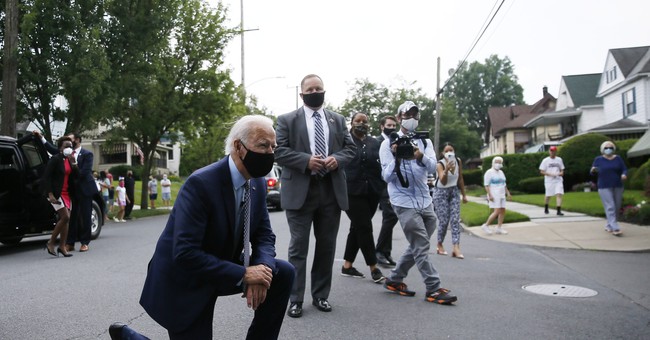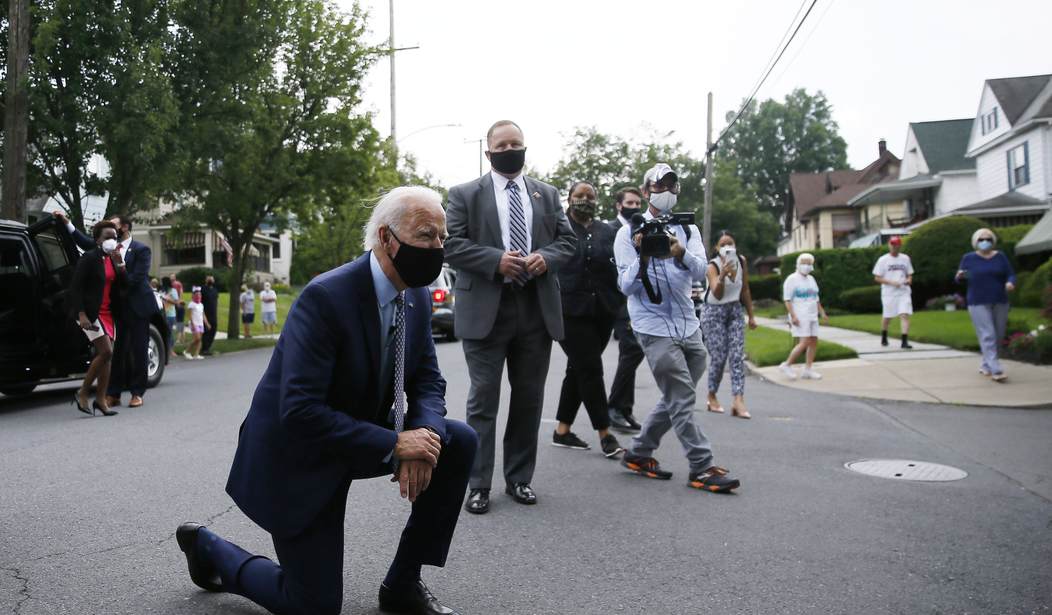
I am a notable exception.
Whereas that might be a compliment in most situations (after all, I live a blessed life, from having a wonderful family to having fulfilling work such as working with my RedState colleagues on RED + BLACK each week), being called “notable” does not come across as complimentary when said by the Democrats’ 2020 presumptive presidential nominee, former Vice President Joe Biden.
If you are a Democrat heading this summer on the “I Still Can’t Believe Hillary Loss” 2020 campaign tour, you should be rather concerned.
In some oddly incoherent and politically lazy fashion, the Democrats continue to show the voting bloc that supports them the most that Democrats actually know about them the least. In Biden’s latest gaffe – a diversity quote that sought to pander to one fairly-loyal minority voting bloc (i.e., Latinos voted for Democrats to the clip of 66% in 2016) by throwing a more loyal voting bloc (e.g., Black voters supported Stacy Abrams at a 93% clip in Georgia just two years ago) completely under the bus (as I noted on this week’s show).
It is as if no one understands that the world is an ever-evolving place. Within that world, the United States of America is a nation of constant cultural change due to our richness of diversity and expansion of population and affluence — both domestically and internationally. And within that ongoing metamorphosis are the rapidly-shifting tastes, viewpoints, and adaptations that Blacks in America (from the descendants of American slavery to immigrants from the West Indies and the African continent) infuse into our shared social fabric.
Getting into how and why Republicans seem to miss this point with African-American voters is for another time and place. There is a contemporary course-of-action – driven by smart, modern conservatism – that could remedy the decades-long scarred dynamic of mutual mistrust and animus between Blacks and the GOP. However, that dynamic will take concentrated efforts (not caricatures parading as concerned Black advocates) and effective, communicative, and diverse (i.e., both Black and non-Black) leadership. Further, that will take time to “catch up” on lost decades of relationship-building moments, being present consistently, not just weeks before an election.
Yet, the Democrats – and particularly, the former Vice President, whose 2008 ticket mate was likely in the third grade when he was a surprise victor for the US Senate in 1972 – should not have this problem. Apparently, they do.
It must be frustrating for the Black Democrat to watch the 2020 presidential cycle continue to play out in the same manner as the 2016 presidential race did. Missteps that insulted Americans as “deplorables” four years ago has evolved into “…poor kids are just as bright as White kids…” and “…you ain’t Black…” statements. Yet, what is more frustrating for all Black voters is the stark reality that most of the political power players in America view African-Americans as a timeless, unchanging monolith.
Black voters of 2020 are not the same as Black voters were in 2018. Two years ago, there was not the return of high unemployment rates in Black communities as a result of COVID19 shutdowns that mirror the devastating rates that crushed many African-Americans during the Great Recession. Black voters in 2018 were not the same as Black voters were in 2016. If they were, both Stacy Abrams and Andrew Gillum would be governors today. Yet, because of their incongruency with Black voters on key issues such as school choice, Democrats overplayed their hand with Black voters with disappointing consequences on Election Night 2018.
Black voters of 2016 were not the same as Black voters in 2012. The high-profile tragedies involving Tamir Rice, John Crawford III, Timothy Russell, and Malissa Williams just in Cleveland alone had not occurred by the time President Obama won re-election. Just the same, the piercing realization by frustrated Blacks that these incidents of police misconduct from Pittsburgh to Chicago to Los Angeles continued to transpire in cities led by Democrats, not Republicans had not been actively voiced with increasing dissension. Just as well, Blacks watched the nation’s economic advances over that time affect them at a slower pace, with other notable gaps stubbornly persistent despite “progress” under the first African-American president.
Black voters in 2012 were not the same as Black voters were in 2007 and 2008. Does anyone remember a time when Black voters had to be “convinced” that, despite his lack of a Negro dialect and White mother from Kansas, then-Senator Barack Obama was “Black enough” to be considered for the 2008 presidential nomination? Or when Black voters gave then-Senator Clinton a nearly 2-to-1 advantage over Obama in late 2007, with Black women giving Clinton nearly two-thirds of their support via polling? Even with the euphoric voting phenomenon that led to Obama’s November 2008 victory in tow, the magic could not be duplicated in quite the same way in 2010 (as his old US Senate seat was lost) or 2014 as Republicans made significant gains in both elections.
People change, and people who must deal with strife and challenges are transformed by them. Thus, it should come as no surprise that the group of Americans that has collectively dealt with the most amount of radical cultural, societal, and legal changes over the course of our shared history (e.g., from slavery to Jim Crow to the Civil Rights Movement of the 20th Century) would also be the one with some of the most diversity, most evolutions of thought and perspectives, and most prevalent expressions when it comes to politics and policy in America. This should be obvious, but in a sad manner that continues to limit the true potential of our nation, too many political figures miss this point entirely.
Apparently, another Democrat running for high office has again repeated this avoidable and damaging blunder. Worse still, the impact has more than just electoral ramifications. Until this dynamic is remedied throughout the body politic, the consequences will persist in the forms of underemployment, avoidable healthcare woes, and unfulfilled potential at a time when we need more Americans working, innovating, and living fulfilled and uplifting lives to heal our hurting nation.












Join the conversation as a VIP Member